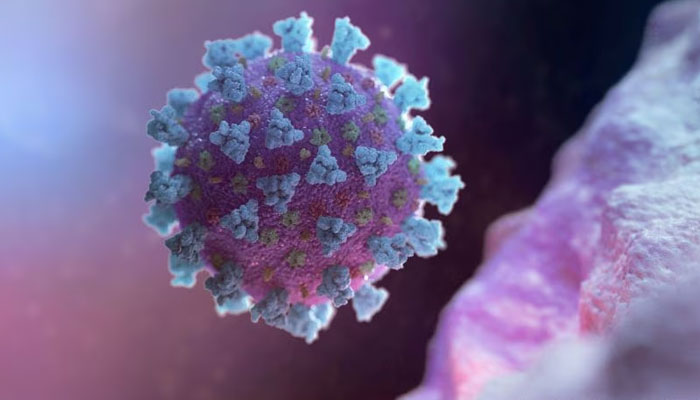Is coronavirus back? Researchers find new lineage of Covid-19
New Covid variant will have an equal or greater escape from antibodies, says virologist Bloom
August 18, 2023

A new, BA.2.86, lineage of Covid-19 has been tracked by United States Centers for Disease Control and Prevention in the US, Denmark, and Israel, which may possibly spread this winter.
"As we learn more about BA.2.86, CDC's advice on protecting yourself from Covid-19 remains the same," the agency said in a post on platform X.
The World Health Organization (WHO) earlier on Thursday said in a post on X that it had classified BA.2.86 as a "variant under monitoring" due to the large number of mutations it carries, reported Reuters.
The WHO added that, so far, only a few sequences of the variant have been reported from a handful of countries.
The new lineage, which has 36 mutations from the currently-dominant XBB.1.5 Covid variant "harkens back to an earlier branch" of the virus, explained Dr. S. Wesley Long, medical director of diagnostic microbiology at Houston Methodist.
He said it remains to be seen whether BA.2.86 can out-compete other strains of the virus or have any advantage in escaping immune responses from prior infection or vaccination.
Early analysis indicates that the new variant "will have equal or greater escape than XBB.1.5 from antibodies elicited by pre-Omicron and first-generation Omicron variants," Jesse Bloom, a virologist at the Fred Hutchinson Cancer Center said in a slide deck published on Thursday.
The Omicron subvariant XBB.1.5 is the strain targeted by vaccines in upcoming Covid booster shots.
Bloom's slides note that the most likely scenario is that BA.2.86 is less transmissible than current dominant variants, so it may never spread widely, but more sequencing data is needed to prove this theory.
"My biggest concern would be that it could cause a bigger spike in cases than what we have seen in recent waves," Dr Long said. "The boosters will still help you fight off Covid-19 in general."A new, BA.2.86, lineage of Covid-19 has been tracked by United States Centers for Disease Control and Prevention in the US, Denmark, and Israel, which may possibly spread this winter.
"As we learn more about BA.2.86, CDC's advice on protecting yourself from Covid-19 remains the same," the agency said in a post on platform X.
The World Health Organization (WHO) earlier on Thursday said in a post on X that it had classified BA.2.86 as a "variant under monitoring" due to the large number of mutations it carries, reported Reuters.
The WHO added that, so far, only a few sequences of the variant have been reported from a handful of countries.
The new lineage, which has 36 mutations from the currently-dominant XBB.1.5 Covid variant "harkens back to an earlier branch" of the virus, explained Dr. S. Wesley Long, medical director of diagnostic microbiology at Houston Methodist.
He said it remains to be seen whether BA.2.86 can out-compete other strains of the virus or have any advantage in escaping immune responses from prior infection or vaccination.
Early analysis indicates that the new variant "will have equal or greater escape than XBB.1.5 from antibodies elicited by pre-Omicron and first-generation Omicron variants," Jesse Bloom, a virologist at the Fred Hutchinson Cancer Center said in a slide deck published on Thursday.
The Omicron subvariant XBB.1.5 is the strain targeted by vaccines in upcoming Covid booster shots.
Bloom's slides note that the most likely scenario is that BA.2.86 is less transmissible than current dominant variants, so it may never spread widely, but more sequencing data is needed to prove this theory.
"My biggest concern would be that it could cause a bigger spike in cases than what we have seen in recent waves," Dr Long said. "The boosters will still help you fight off Covid-19 in general."









